Pepper plants need evenly moist soil to produce the best possible harvest. With consistent, deep watering, your peppers will produce the best quality fruits.
However, there comes a point when the plants have had enough water. Any more, and you put the plant at risk of unnecessary stress.
In this article, I’ll share 7 signs of overwatering pepper plants, and how to water properly. How often you should water peppers depends on your soil, weather conditions, and growing container. Let’s get into it!
7 Signs Of Overwatering Pepper Plants
Pepper plants will let you know when they have too much water. If you are noticing signs of overwatering, it is important to take immediate action (or, inaction…) and stop watering!
1. Wilting leaves
Wilting leaves can indicate a variety of issues. Most often, they are a sign of underwatering. However, they can also happen when plants are overwatered.
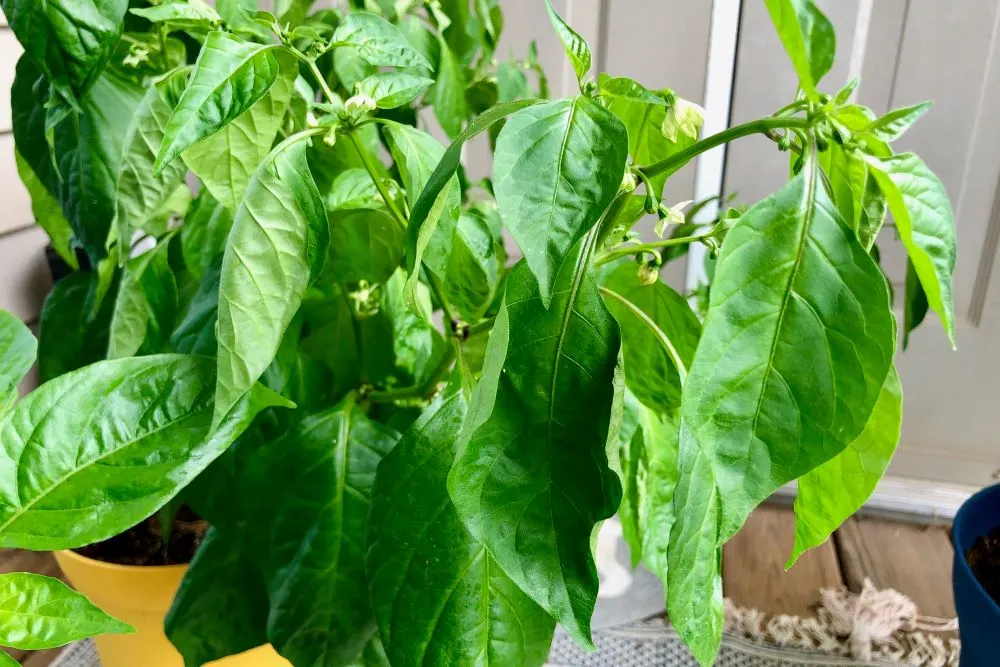
This is one of the more severe signs that your plant is overwatered. Wilting leaves due to too much water means that your soil is either not draining properly, or the roots can otherwise not get enough oxygen.
If your plants are in pots, make sure they can drain excess water. Also, remove any extra water from drip trays. For in-ground plants, you may need to test your soil for drainage.
Raised beds are designed to drain (by being elevated), so this may be a good option if your soil is heavy with clay. Wilting leaves are a serious sign of overwatering, so don’t wait on it!
2. Curling leaves
Another sign of overwatering pepper plants is curling or misshapen leaves. This can occur for a number of reasons, often stemming back to improper watering.
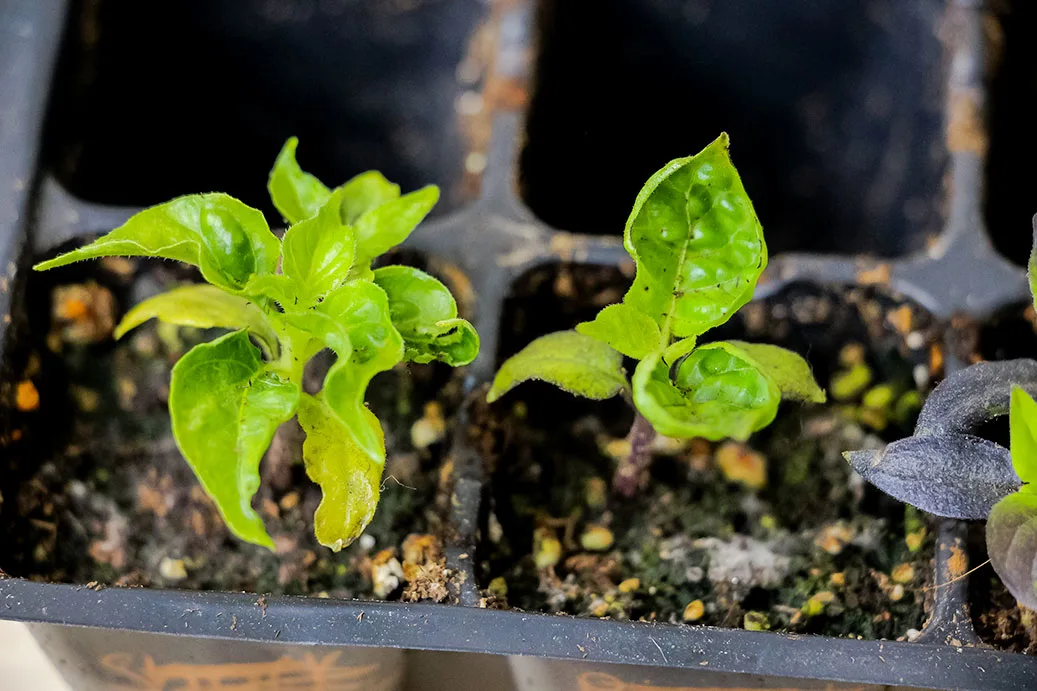
Whether it is a soil bacteria issue, plant disease, or simply oxygen starvation, curling leaves are a symptom of too much water. Back off on the watering regimen, and pay attention to your frequency.
3. Fungus gnats
Another sign you may be overwatering is the presence of fungus gnats. Now, these pests are very common, so if you see them don’t panic. However, they do like to lay their eggs in very moist soil.
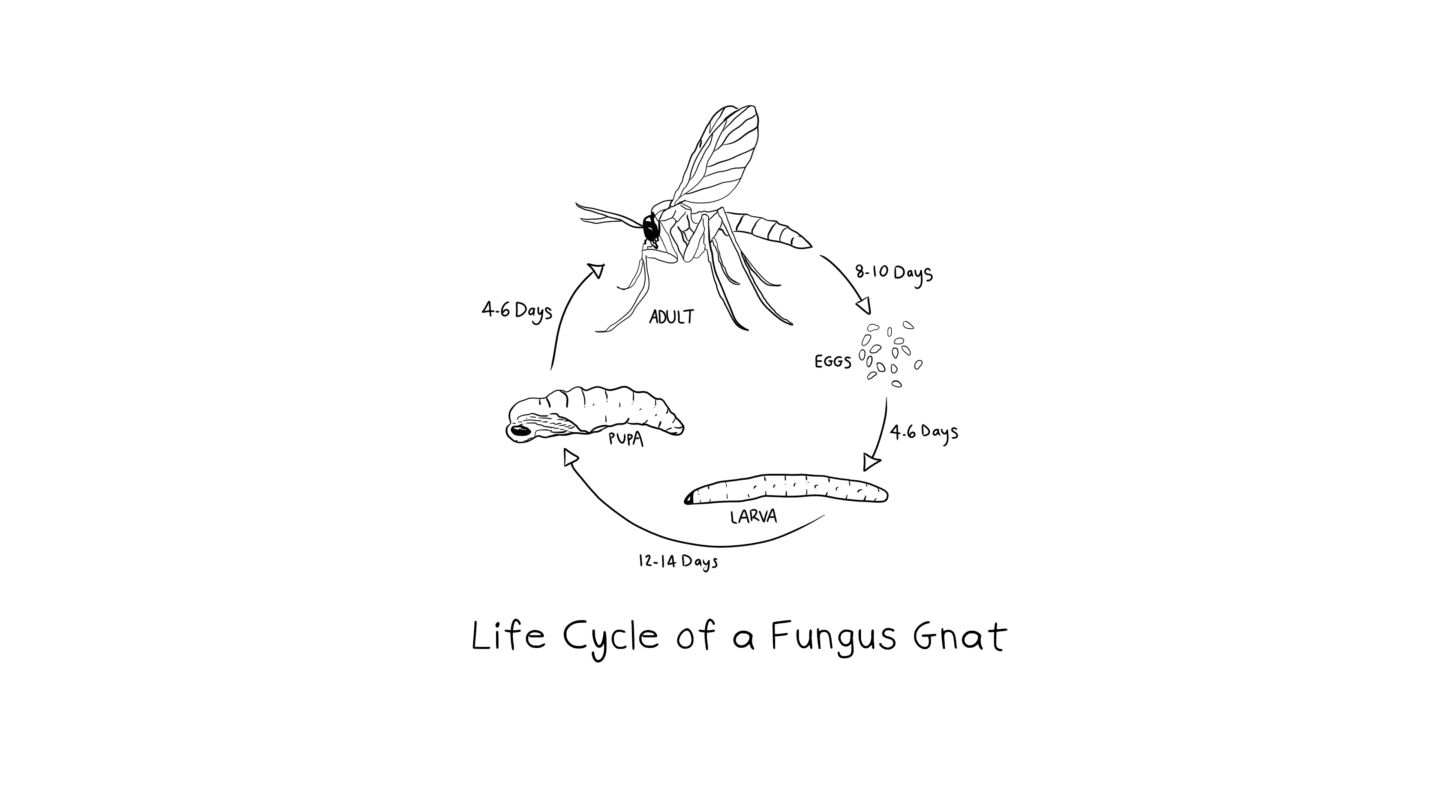
One of the best ways to reduce fungus gnat populations is to stop overwatering. By allowing the first inch of soil to dry out, the gnats are less likely to use your soil as a breeding ground.
Since fungus gnats are a bigger issue than just watering, you’ll need to take additional steps to get rid of them indoors. I use mosquito bits to kill larvae in the soil, and yellow sticky traps to catch the flying adults.
4. Yellowing leaves
Prolonged overwatering can lead to yellowing leaves. Yellow leaves is usually a sign of nutrient deficiency in the plants. When you water too much, you may be flushing out vital nutrients from the soil, leaving your peppers without much to use.
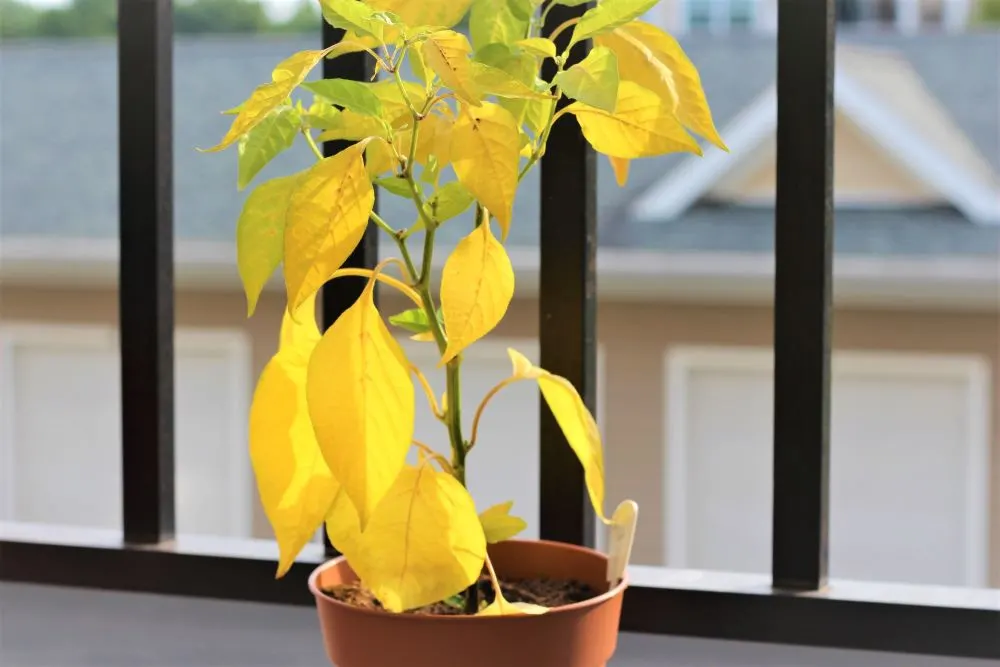
Instead of continuing to overwater and upping the nutrients, simply reduce your watering if possible. Of course if the overwatering is caused by excessive rain, there isn’t much you can do. In this case, I recommend amending your soil with a slow-release fertilizer that won’t wash away with the rain.
5. Root rot
While it may be difficult to diagnose, root rot is a late-stage symptom of overwatering. When your pepper plant’s roots have been submerged in water, they will eventually begin to rot and die.
This is more common in hydroponic systems, but can happen in severe cases of overwatering. The roots will turn from white to brown, become slimy, and may even smell bad.
6. Mold on soil
Mold is not necessarily a bad thing to see in the garden. It is a sign of fungal life, and can actually be viewed as a good thing. However, seeing it on your soil’s surface does indicate excess moisture.
While mold alone isn’t a major cause for concern, it may be a sign that you are watering too much. Algae growth is another sign that the surface of your soil is remaining wet for too long. Allow the soil’s surface to dry out between watering.
7. Stunted or dying plants
Root rot and poor drainage can be difficult to diagnose without digging up your soil. However, if you notice stunted or dying plants, this may be caused by overwatering.
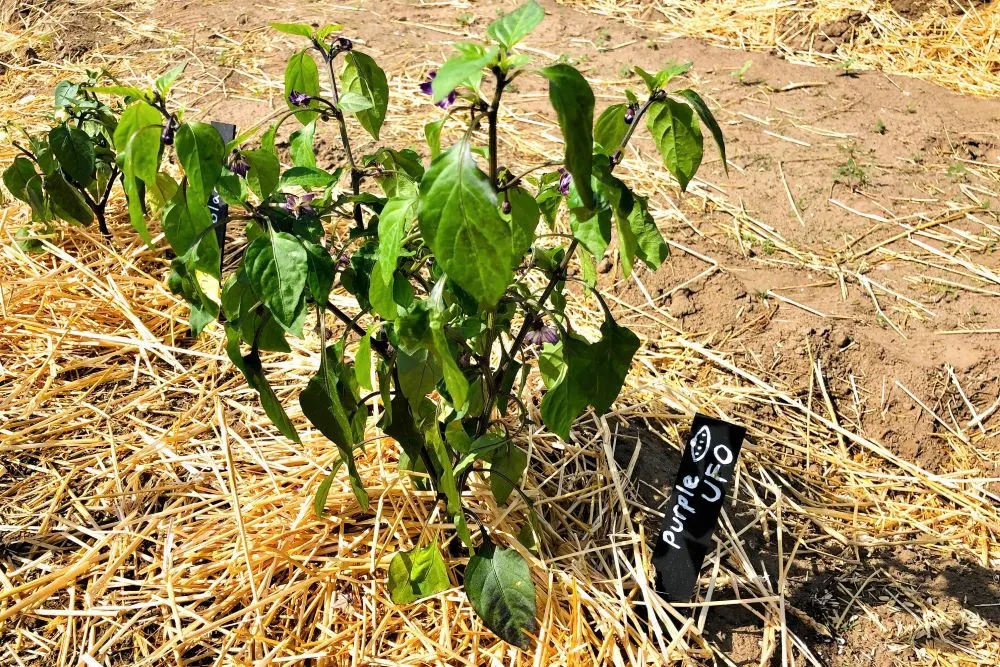
If your plant’s roots can’t access oxygen (because they are submerged in water), then they will begin to die quickly. If you notice droopy plants or stunted growth, it may come down to your watering habits. Try cutting back on water and improve airflow to do your best to fix the issue.
How To Water Pepper Plants Properly
Even watering is key to healthy, productive pepper plants. Too little or too much water in the root zone can lead to problems. When in doubt, it is best to hold off watering rather than watering too much.
Pepper watering tips:
- Water deeply. Giving your peppers a light watering every day or two can lead to shallow root development. This leaves them vulnerable to drought, and leads to more frequent watering. Water deeply every time you irrigate (slow and steady water for several minutes is ideal). This encourages deeper root growth and a more resilient plant.
- Allow the surface to dry between watering. It is okay if the soil dries out between each watering. To test it, dig your finger 2-3 inches below the surface to feel for moisture. Often the first inch or two of soil will dry out, while it is still moist below (where the root are). This is especially true for in-ground plants.
- Elevate plants. If your in-ground soil does not drain well, you can plant your peppers on raised mounds. This essentially acts like a “raised bed,” naturally improving drainage.
- Water at the base of the plant. Avoid overhead irrigation, as wet pepper leaves encourages the spread of disease. Also, soil can splash up onto the lower leaves, which can introduce soil-borne diseases to your plant.
- Use rain water if possible. Rain water is usually more acidic than tap water, and contains less chemicals. The lower pH of rain water can help your pepper plants better absorb nutrients. If you own a roof, use a simple downspout diverter kit and a rain barrel to collect your own rain water!
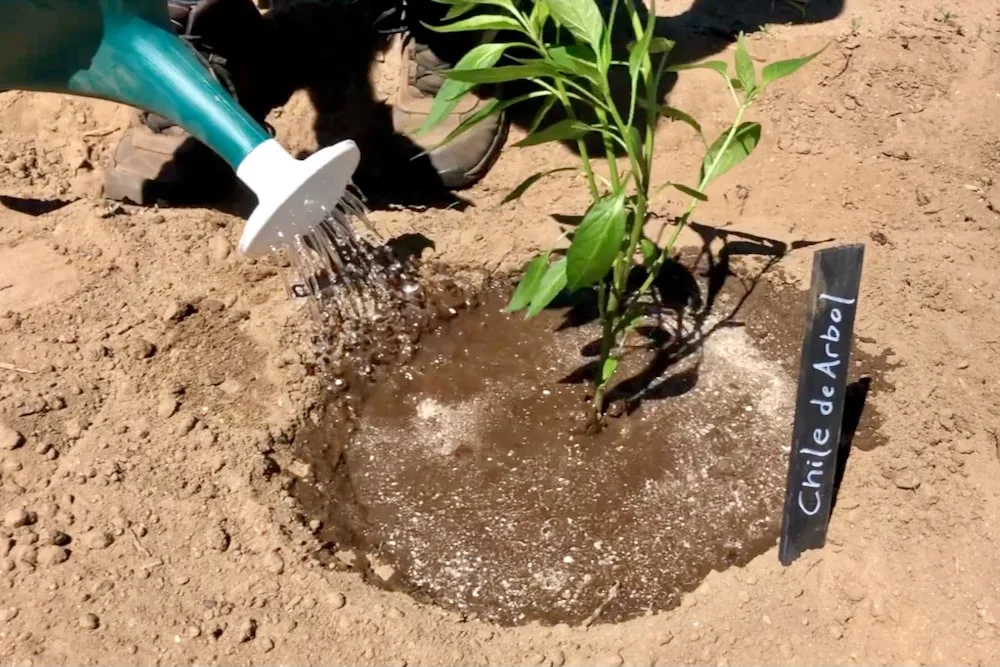
While these tips should help you water properly, you should learn the main factors that affect how often to water.
Container type
If you grow in pots, your plants will need much more frequent watering than in-ground plants. This is because the soil is less insulated from the dry air and wind. Also, each plant’s root system is constrained to a relatively small body of soil.
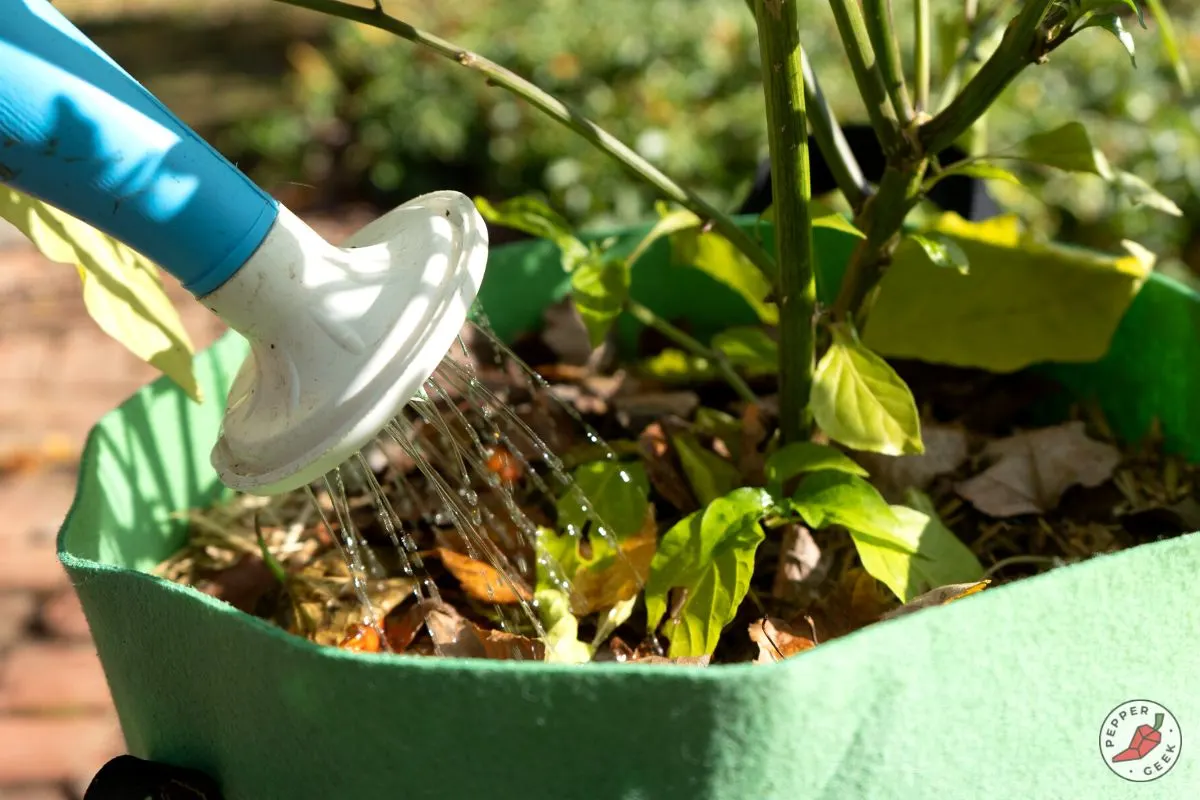
As a result, in hot summer weather, you may need to water your potted peppers daily. In ground plants can develop deeper roots where more water is available. This reserve keeps the plants hydrated through drought periods.
Soil type & testing
If you are growing in ground soil (in-ground or in raised beds), then you may wish to test the soil. Sandy soil (which drains faster) will require more frequent watering. Clay-rich soil will need less frequent watering.
Weather conditions
Hot weather leads to more water loss in pepper plants. If you are going through a heat wave, or simply live in a hot climate, your plants will use more water.
Temperature is directly correlated with water loss (transpiration) in pepper plants, so be prepared to irrigate more frequently in summer.
I hope this article has helped you know when you are overwatering your peppers. Proper watering technique can help keep your plants happy and improve your pepper harvest!


Randie
Tuesday 10th of October 2023
Why is My pepper plant leaves light green they got pepper. There in a drainnage pot I water in morning and evening
peppergeek
Wednesday 11th of October 2023
Sounds like they may need nitrogen - fertilize! Or it could be cold weather if that is applicable.